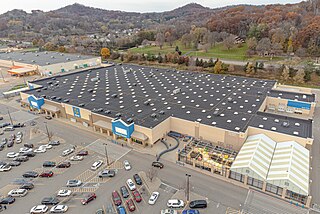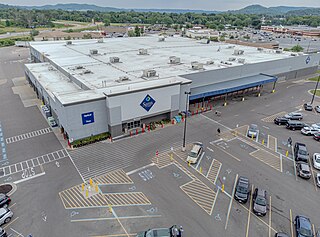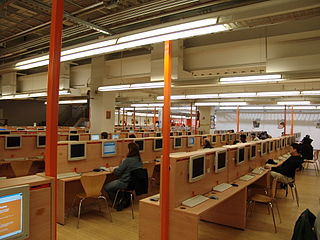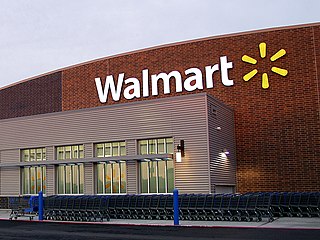In business, self-competition is competition by a company with itself for customers. This can include one product or retail location competing with another.
In business, self-competition is competition by a company with itself for customers. This can include one product or retail location competing with another.
Any company which provides multiple products may suffer from product self-competition. Similar products are more likely to have this issue. For example, a bakery which offers raspberry muffins and then adds blackberry muffins will likely see a decline in sales of the original product, although the total sales of both products will likely be higher than the original single product. If total sales do not increase, then this will have a negative impact on the business. However, even if total sales do increase slightly, this may still lower profits, as producing two products increases costs over a single product. Therefore, only a large increase in total sales would justify the addition of the new product.
In order to limit self-competition, new products should ideally be significantly different from existing products. In the bakery example, bran muffins would create less competition with raspberry muffins. Adding whole loaves of bread to the product mix would create even less competition.
A related issue involves two retail locations for the same company that are situated close to one another. The first location will likely see a decline in business when the new location is added. Just how far away two locations must be to avoid this effect depends on the type of business. For newspaper stands, they could be relatively close, as customers are often on foot and unlikely to walk more than block or two. For amusement parks, the distances must be much larger, as people are willing to drive long distances to spend the day at such an attraction. In the case of ski resorts, people are even willing to fly long distances. Furthermore, franchisers, like McDonald's, do not actually allow for their products to be placed within a certain mile radius of an already established franchise.
Sometimes, there will be two separate instances of a retail business less than a half mile apart. For instance, Subway has become a densely populated fast food franchise, and the opening of Wal-Mart stores has resulted in internal competition with separate Subway restaurants nearby since Subway has been integrated into Wal-Mart stores.
Sometimes, brief internal competition can be a consequence of having clearance items in a store's inventory, in which prices are decreased to encourage customers to clear out the clearance items. Other tactics can involve delaying introduction of some versions of certain products since it can also save some companies money.
Self-competition is a common side-effect of mergers and acquisitions, as the new combined business often has similar products and nearby retail locations. The success of the business often depends on their ability to eliminate similar products and redundant retail locations. Ideally, the most profitable products and locations should be kept, regardless of the source company. In some cases, the best attributes of each product may be retained. For example, one company may offer a superior food product, but the other may have better packaging, perhaps a resealable bag.
While any company which offers more than a single product can suffer from the effects of self-competition, the larger a company becomes, in terms of market share, the more it becomes an issue. In the case of General Motors, they were eventually forced to drop their entire Oldsmobile line, as it was largely redundant with Buick, and to a smaller extent Chevrolet, though Pontiac which also later got axed as well had a sporty flare to it which made it look less redundant.

Walmart Inc. is an American multinational retail corporation that operates a chain of hypermarkets, discount department stores, and grocery stores in the United States, headquartered in Bentonville, Arkansas. The company was founded by brothers Sam and James "Bud" Walton in nearby Rogers, Arkansas in 1962 and incorporated under Delaware General Corporation Law on October 31, 1969. It also owns and operates Sam's Club retail warehouses.

A convenience store, bodega, convenience shop, corner store or corner shop is a small retail store that stocks a range of everyday items such as tea, coffee, groceries, fruits, vegetables, snacks, confectionery, soft drinks, ice creams, tobacco products, lottery tickets, over-the-counter drugs, toiletries, newspapers and magazines.

A supermarket is a self-service shop offering a wide variety of food, beverages and household products, organized into sections. This kind of store is larger and has a wider selection than earlier grocery stores, but is smaller and more limited in the range of merchandise than a hypermarket or big-box market. In everyday United States usage, however, "grocery store" is often used to mean "supermarket".

Samuel Moore Walton was an American business magnate best known for founding the retailers Walmart and Sam's Club, which he started in Rogers, Arkansas and Midwest City, Oklahoma in 1962 and 1983 respectively. Wal-Mart Stores Inc. grew to be the world's largest corporation by revenue as well as the biggest private employer in the world. For a period of time, Walton was the richest person in the United States. His family has remained the richest family in the U.S. for several consecutive years, with a net worth of around US$240.6 billion as of January 2022. In 1992 at the age of 74, Walton died of blood cancer and was laid to rest at the Bentonville Cemetery in his longtime home of Bentonville, Arkansas.
Shoppers Drug Mart Inc., commonly known as Shoppers is a Canadian retail pharmacy chain based in Toronto, Ontario. It has more than 1,300 stores in ten provinces and two territories.

Loblaw Companies Limited is a Canadian retailer encompassing corporate and franchise supermarkets operating under 22 regional and market-segment banners, as well as pharmacies, banking and apparel. Loblaw operates a private label program that includes grocery and household items, clothing, baby products, pharmaceuticals, cellular phones, general merchandise and financial services. Loblaw is the largest Canadian food retailer, and its brands include President's Choice, No Name and Joe Fresh. It is controlled by George Weston Limited, a holding company controlled by the Weston family; Galen G. Weston, is the chair of the Loblaw board of directors, as well as chair of the board of directors and CEO of Canada-based holding company George Weston.

Sam's West, Inc. is an American chain of membership-only warehouse club retail stores owned and operated by Walmart Inc., founded in 1983 and named after Walmart founder Sam Walton as Sam's Wholesale Club. As of January 31, 2019, Sam's Club ranks second in sales volume among warehouse clubs with $84.3 billion in sales, behind its main rival Costco Wholesale.

Cross-docking is a logistical practice of Just-In-Time Scheduling where materials are delivered directly from a manufacturer or a mode of transportation to a customer or another mode of transportation. Cross-docking often aims to minimize overheads related to storing goods between shipments or while awaiting a customer's order. This may be done to change the type of conveyance, to sort material intended for different destinations, or to combine material from different origins into transport vehicles with the same or similar destinations.

The American multinational retail chain Walmart has been criticized by many groups and individuals, such as labor unions and small-town advocates, for its policies and business practices, and their effects. Criticisms include charges of racial and gender discrimination, foreign product sourcing, anti-competitive practices, treatment of product suppliers, environmental practices, the use of public subsidies, and its surveillance of its employees. The company has denied any wrongdoing and said that low prices are the result of efficiency.
The loyalty business model is a business model used in strategic management in which company resources are employed so as to increase the loyalty of customers and other stakeholders in the expectation that corporate objectives will be met or surpassed. A typical example of this type of model is: quality of product or service leads to customer satisfaction, which leads to customer loyalty, which leads to profitability.
Hypermart USA was a demonstrator project operated by Walmart in the 1980s and 1990s, which attempted to combine groceries and general merchandise under one roof at a substantial discount. The hypermart concept was modeled after earlier efforts from other retailers, notably French retailers such as Auchan and Carrefour, and the Midwestern big retailer Meijer. At it's peak Hypermart USA had 4 locations. 2 located in Texas, one in Kansas, and one in Missouri.

EasyInternetcafé was a chain of Internet cafés and a unit of Stelios Haji-Ioannou's EasyGroup.

Comet Electricals Limited, trading as Comet, is an online electrical retail chain based in the United Kingdom. The company sells consumer electronics and white goods, along with related products and services. Its predecessor, under the same brand name, pioneered the concept of the out-of-town discount warehouse in the United Kingdom.
George Weston Limited, often referred to as Weston or Weston's, is a Canadian holding company. Founded by George Weston in 1882, the company today consists of the Choice Properties real estate investment trust and Loblaw Companies Limited, Canada's largest supermarket retailer, in which it maintains a controlling interest. Retail brands include President's Choice, No Name and Joe Fresh. The former Weston Bakeries division, which owned the brands Wonder, Country Harvest, D'Italiano, Ready Bake and Gadoua, was sold off to FGF Brands in 2022. The company is controlled by the Weston family, which owns a majority share in George Weston Limited.

The history of Walmart, an American discount department store chain, began in 1950 when businessman Sam Walton purchased a store from Luther E. Harrison in Oklahoma City, Oklahoma, and opened Walton's 5 & 10. The Walmart chain proper was founded in 1962 with a single store in Rogers, expanding inside Oklahoma by 1968 and throughout the rest of the Southern United States by the 1980s, ultimately operating a store in every state of the United States, plus its first stores in Canada, by 1995. The expansion was largely fueled by new store construction, although the chains Mohr-Value and Kuhn's Big K were also acquired.

Marvellous Mmmuffins, also known as mmmuffins, was a Canadian restaurant chain that sold coffee and muffins. It was established in 1979 and granted its first franchise in 1980.

Retailing in India is one of the pillars of its economy and accounts for about 10 percent of its GDP. The Indian retail market is estimated to be worth $1.3 trillion as of 2022. India is one of the fastest growing retail markets in the world, with 1.4 billion people.
Retail leakage occurs when local people spend a larger amount of money on goods than local businesses report in sales, usually due to people traveling to a neighboring town to buy goods. Retail sales leakage occurs when there is unsatisfied demand within the trading area and that the locality should provide extra stores spaces for such type of businesses. After all, retail leakage does not necessarily translate into opportunity. For instance, there could be tough competition in a nearby locality that leads the market for same type of product. Many small - to medium-sized communities experience leakage of retail expenditures as local citizens drive to neighboring towns to shop at national retail chains or eat at national restaurant chains. Attracting such national retail chain stores and restaurants to a community can prevent this type of expenditure leakage and create local jobs.
Retailing in South Korea consists of hypermarkets, department stores, flea markets, traditional markets, and underground shopping malls. Hypermarkets sell dry goods and groceries, similar to Western supercentres. Traditional markets are also popular throughout South Korea.